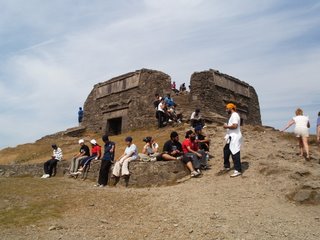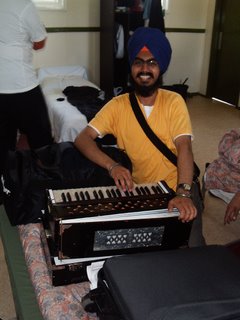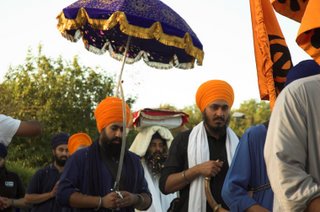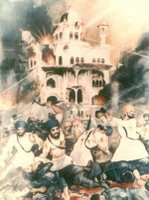I applied to go to Boss Sikhi Camp in 2001. It would have been my first experience of a camp and I was really looking forward to but also bit worried because I had recently kept Kesh and didn't know any Sangat. Unfortunately I couldn't make Sikhi Camp 2001 because I fell over and fractured my foot when walking to work from my lunch break - just a week before the camp! Waheguru. My first Sikhi Camp was in summer 2005 that was held in Southampton. As like with Khalsa Camp, there are some misconceptions of Sikhi Camp that it is a camp for Amritdharis or for particular Jatha (group) and that anyone who isn't Amritdhari or cuts their hair is treated badly or not given respect. Far from the truth! Everyone is given respect and dignity in the camp and everyone enjoys the pyaar of Guru Sahib and Gursikhs. It was an excellent camp and I thoroughly enjoyed having darshan of Guru jee and Saadh Sangat for a whole week - so I attend camp in 2006 as well.
What to expect from Sikhi Camp? The organisers always pick nice locations. In 2005 the camp was held at Southampton sea-side and last year it was held in a picturesque part of Wales.

Chardikalaa Gursikhs from early as 2am would start Simran in the Diwaan. At 4am Sri Guru Granth Sahib jee's Saroop was brought with great grandeuar and majesty to the Diwaan and Guru jee's Parkaash seva was done. This was followed with the Amrit-Vela Simran, Nitnem and Aasa Ki Vaar. Although it was not compulsary for all campers, the MAJORITY of campers out of personal choice attended Amrit-Vela and enjoyed it very much. Everyone I have to spoken to who has been to Sikhi Camp will say that the highlight of camp was the way devotion and respect was shown to Sri Guru Granth Sahib jee!

Everyone has to be inside the Guru's Darbaar for 7am for morning Diwaan. In the morning Diwaan everyone recited Japji Sahib that was followed by Ardaas and Hukamnama which was explained and expanded upon in English by knowledgable Gursikhs who related the Hukamnamas to daily life and the individual. This was followed by breakfast.


From 9am to 1pm there were talks followed by informal and open group discussions sitting on the grass. It was very relaxing but if you're not careful you can get sun burnt! Best to sit in the shade! I know some people get worried that the talks or speakers will be talking down to others, however all the campers I spoke to found the the talks as non-judgemental and welcoming. The discussions allowed campers to share their views and raise questions regarding the talks.


Lunch was from 1pm to 2pm. This followed by activities up to 5pm. The activities were organised and run by the Army. The activities were hiking, abseiling, assault course, football, archery and there was a water sport (but I didn't go because most people came back drenching wet from head to toe!).


5pm to 6pm was relax and refresh time. 6pm sharp everyone used to be in the Guru's Darbaar. The atmosphers of the Guru Darbaar is electric. There would be Keertan by campers followed by Rehraas Sahib, Aarti De Shabad sung, Ardaas and Hukamnama. During both camps the weather was very hot. It was amazing to see campers volunteer to fan the Sangat using pieces of large cardboard. Very humbling to see.
Langar was served after the evening Diwaan. The Langar was Chardikalaa! Like Khalsa Camp, the cakes and other nice treats were great! Aunty jees worked really really hard in Langar seva.


Sikhi Camp is great place for making friends from all over the UK. Through Sangat of others you learn from one and another. Its a relaxed environment where you can enjoy yourself and learn about Sikhi.
On the last day of the camp there was an extended Keertan Darbaar. Great Keertan that everyone enjoyed and took part in.


The coach journey going to camp and coming back was memorable. On the Southall coach everyone did Keertan. It was an amazing atmosphere and nice way to end camp with.
Boss Sikhi Camp is really nice camp to meet Gursikhs, make friends and learn about Sikhi. I would recommend it to everyone.
Mark your calendar for Sunday 26th August to Saturday 1st September to participate in the camp. For more information and to apply, check out www.SikhiCamp.com. If you wish to get £10 discount, then apply before 30th June.







































